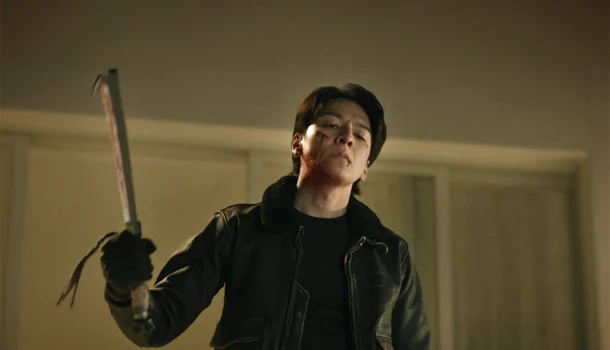It is often in moments when despair becomes intimate that certain men choose to rewrite their trajectories, as though chaos were handing them a secret map back to who they once were — before ruin, before detours, before exhaustion set in. This isn’t about gratuitous redemption, but about a visceral urgency to reclaim a buried sense of identity, lost beneath layers of violence, disillusionment, and self-preservation. In the dramas of these characters, shaped by bitterness and silence, there pulses a muted cry against the notion that destiny is inescapable. They do not merely resist the harm inflicted upon them — they fight the creeping amnesia that threatens to unmake them from within.
It’s within this raw, stylized pulse that “Demon City”, directed and written by Seiji Tanaka, finds its footing. Drawing from the long and shadowy manga series “Onigoroshi” by Masamichi Kawabe, the film drifts between codes of honor and bloodshed meticulously choreographed, fluidly blending the emotional brutality of “John Wick” with the operatic violence of “Kill Bill”. Here, violence is no mere visual flourish — it is the moral architecture of the protagonist, shaping his logic and placing him as the last carrier of a battered but unyielding code of steel.
Tanaka does not hesitate to elevate the solitary hitman archetype into a myth of his own — a specter shaped by unbearable loss and a personal ethic that endures even amid the collapse of meaning. The murder of his wife and child isn’t just the catalyst for revenge; it’s the implosion of the only symbolic shelter that preserved his humanity. Thus, Shûhei Sakata, portrayed with austere intensity by Tôma Ikuta, is not merely chasing retribution: he seeks to reconfigure a world that no longer makes sense — even if it means eliminating every ghost along the way.
There is something bitter and deeply unsettling in this kind of narrative: it reminds us that civilization is upheld by a fragile treaty of meanings that can shatter without warning. These fights are not merely between men, but between possible ways of surviving the collapse of everything once held sacred. Fidelity, compassion, justice — within “Demon City”, these values feel like relics to be violently unearthed or defended with the edge of a blade.
If the world still clings to the illusion of moral progress, this film seems to laugh at the notion with somber irony. In a grim and stylized setting, Tanaka builds a universe where barbarity is no longer the exception — it has become the vernacular. The antagonists — operatives of the secretive Kimen-gum organization — are not layered individuals, but manifestations of a malignancy that no longer hides behind a mask. They act as cogs in an invisible mechanism whose primary aim is the erosion of identity. And in this scorched terrain, Sakata’s return to killing feels less like relapse and more like strategic lucidity: to kill, in this context, is to assert that something still matters.
Across 106 minutes paced with restraint yet devoid of narrative boldness, Tanaka crafts a form of polished surface entertainment — one that avoids challenging the genre’s grammar, yet executes its formula with confidence. The rhythm is foreseeable, and the secrets are rationed with care — always calibrated to avoid alienating the audience. Yet there’s an entrancing quality in the ritualistic repetition of the fight scenes, as though each blow were part of an ancestral dance trying to reshape the world through physical defiance.
“Demon City” does not claim to be a stylistic revolution or a philosophical exploration. Its strength lies in drawing renewed energy from a well-worn archetype. And perhaps that is what lingers most: the sheer persistence of this kind of story, its refusal to fade. As long as there are men who have lost everything — and who, despite it all, choose to go on — there will always be space for tales like this. Not for solace, but for remembrance.
Film: Demon City
Director: Seiji Tanaka
Year: 2025
Genres: Action/Fantasy
Rating: 8/10

